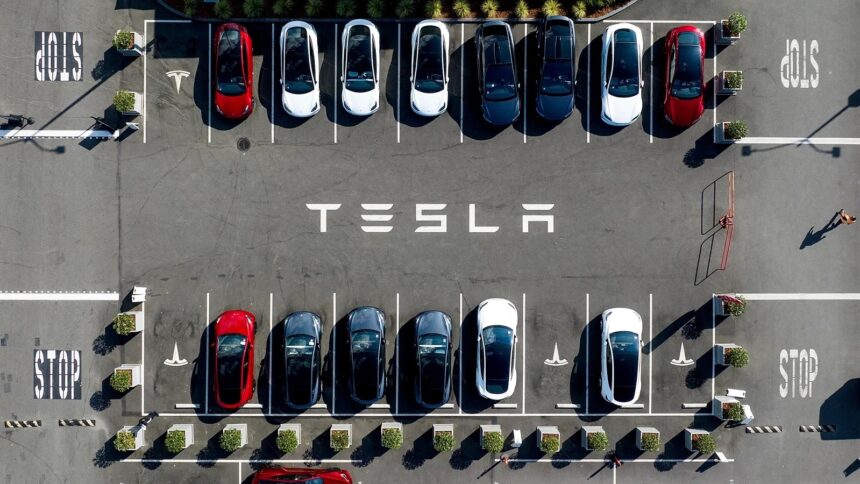Tesla shares went into free-fall on Thursday as President Donald Trump publicly feuded with the electric vehicle maker’s billionaire CEO Elon Musk, his self-proclaimed “First Buddy.”
Investors watched the unfolding drama with growing worry about what the fracas could mean for Musk’s business empire. The carmaker’s shares ended the day down 14%, wiping off $150 billion in market value on a day absent other news about the company.
Traders dumped Tesla in heavy trading after Musk quickly responded to Trump’s criticism with social media posts that stepped up criticism of the president’s tax bill. Trump fired back further, alleging Musk was upset because the bill takes away tax benefits for electric vehicle purchases.
Openly feuding with Trump could pose multiple hurdles for Tesla and the rest of Musk’s sprawling business empire. The U.S. Transportation Department regulates vehicle design standards and would have a big say in whether Tesla can mass-produce robotaxis without pedals and steering wheels.
The agency is also investigating Tesla’s driver-assistance software, known as “Full Self-Driving,” following a fatal crash.
“Elon’s politics continue to harm the stock. First he aligned himself with Trump, which upset many potential Democratic buyers. Now he has turned on the Trump administration,” said Tesla shareholder Dennis Dick, chief strategist at Stock Trader Network.
With EV sales falling, Musk over the last year has re-oriented Tesla’s future around self-driving robotaxis. On an earnings call last year, he said investors “should sell their Tesla stock” if they did not believe the company would solve the technological challenges of driverless vehicles. Wedbush analysts have said the AI and autonomous opportunities could be worth $1 trillion alone in market value for the company.
Musk has advocated for one federal approval process for autonomous vehicles to streamline the current maze of different state regulations.
Ross Gerber, CEO of Tesla investor Gerber Kawasaki Wealth and Investment Management, said the feud with Trump “creates a negative force against Tesla” that could jeopardize regulations and risk more government investigations.
“Every benefit that was perceived he would have got now turns into a negative,” Gerber said.
Musk, the world’s richest man and a key figure in the Department of Government Efficiency’s (DOGE) cost-cutting plan for several months, blasted Trump’s “big beautiful bill” this week, after he decided to spend less time in the White House and instead focus on his companies. Following Thursday’s selloff, his net worth fell by roughly $27 billion to $388 billion, according to Forbes.
Trump on Thursday said on his Truth Social platform that the “easiest way to save money in our , billions and billions of dollars, is to terminate Elon’s governmental subsidies and contracts.”
Transportation Secretary Sean Duffy has already moved to exempt autonomous vehicles from some safety requirements, and NHTSA said in April it is “actively engaged in developing a multi-faceted regulatory framework” for autonomous vehicles.
Although the federal government has already started to streamline some regulations around autonomous driving, Morningstar analyst Seth Goldstein said regulators might possibly craft rules in a way that would single out Tesla.
Most autonomous vehicle companies use sensors such as radar and lidar to detect objects, for example, but Tesla relies solely on cameras.
Goldstein said federal regulators might devise rules requiring lidar, which would hurt Tesla. “With President Trump, being on his bad side always creates risk that you’re going to get personal retaliation,” Goldstein said. He doubted that such an outcome was likely, though, because many other companies have been pushing for new regulations for years.
The stock has been on a roller-coaster ever since Musk endorsed Trump in mid-July 2024 in his re-election bid, gaining 169% from that point through mid-December. That was followed by a 54% slide through early April as a “Tesla Takedown” protest intensified. Musk’s leadership of DOGE and alignment with the Trump administration had put off some car buyers, with sales slumping in Europe, China and key U.S. markets like California.
The House of Representatives version of Trump’s budget bill proposes largely ending the popular $7,500 EV subsidy by the end of 2025. Tesla and other automakers have relied on incentives for years to drum up demand, but Trump promised during the transition to end the subsidy.
Tesla could face a $1.2 billion hit to its annual profit, along with an additional $2 billion setback to regulatory credit sales due to separate Senate legislation targeting California’s EV sales mandates, according to J.P. Morgan.
The company is still the most valuable automaker worldwide by a long shot. Through Wednesday, Tesla’s market value stood at about $1 trillion, well above Motor’s $290 billion.
“There were a lot of people excited about Tesla because the political winds were at his (Musk’s) back. And now they’ve turned into headwinds in a lot of different ways,” Steve Sosnick, chief strategist at Interactive Brokers, said.
Tesla trades at 150 times profit estimates, a steep premium to other Big Tech stocks such as Nvidia.
“I am short Tesla. I don’t understand it. I don’t understand its valuation. I don’t understand its fundamentals. I think it’s overhyped,” Bob Doll, Crossmark Global Investments chief investment officer, said.








